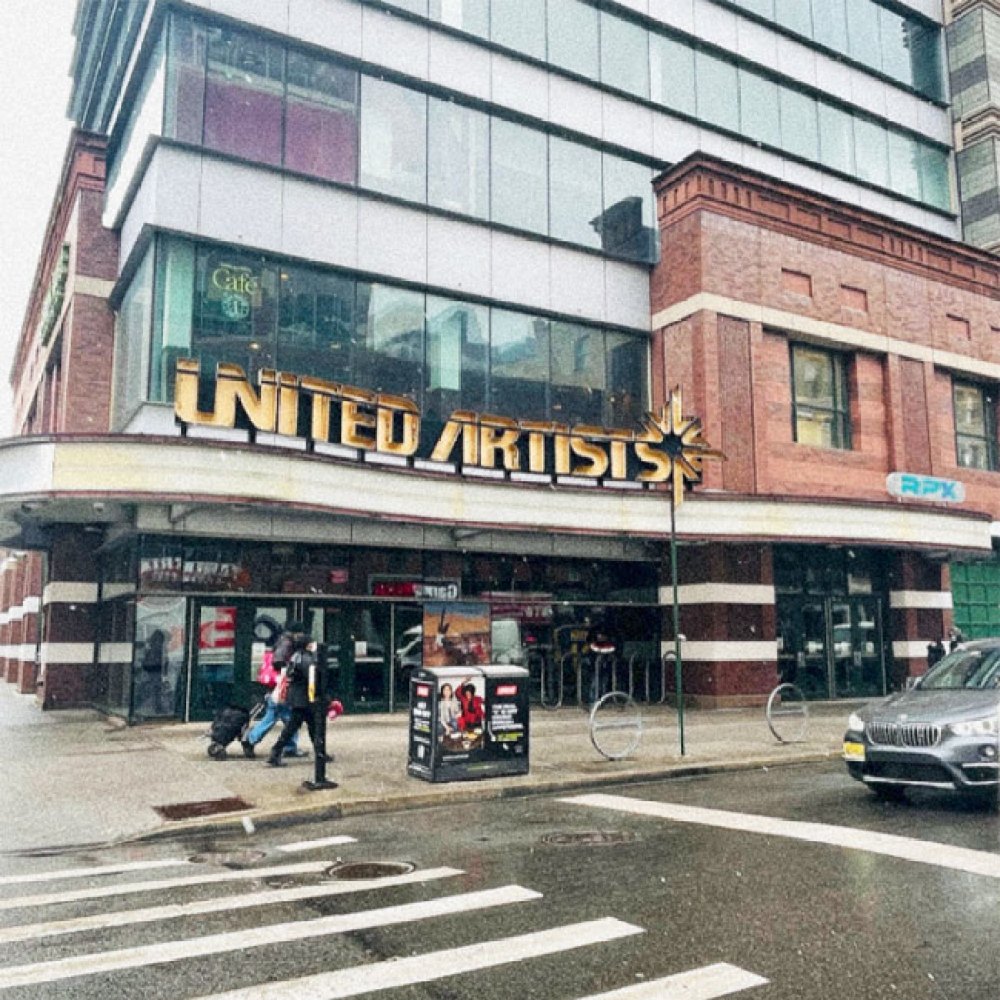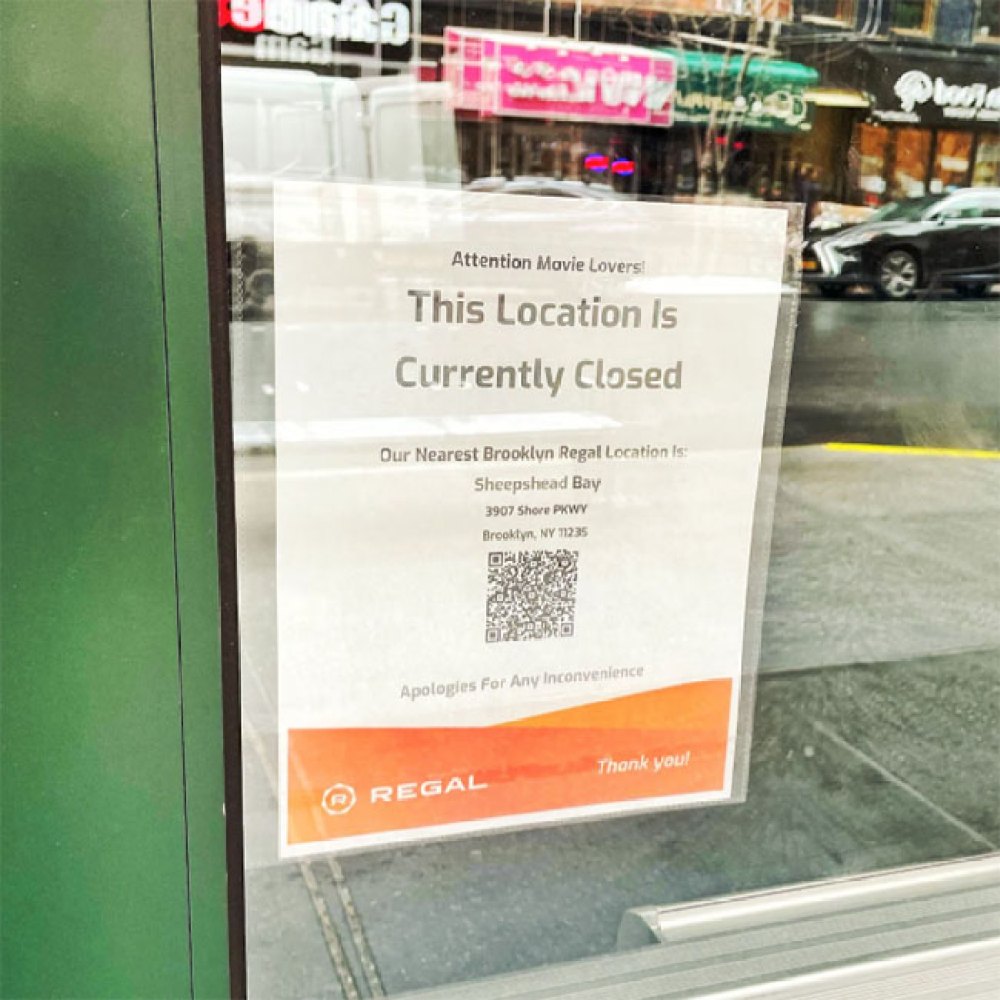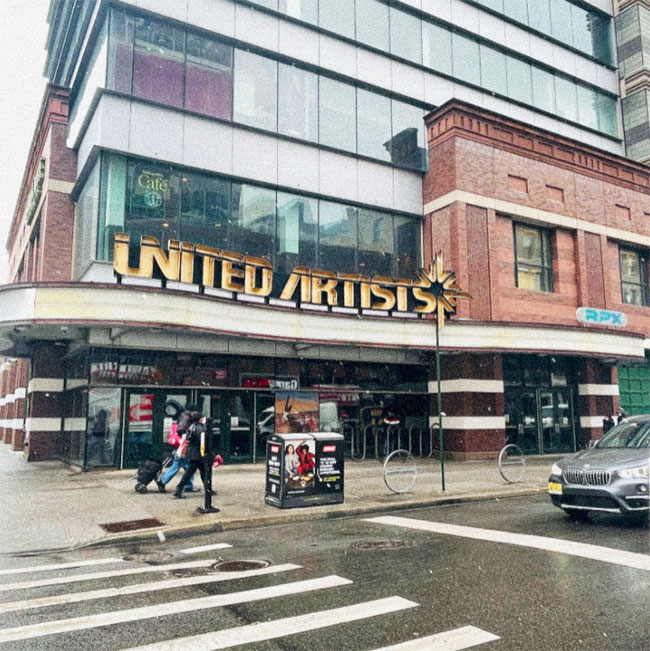
Get to know Abe Beame through the internet’s best thread of movie recommendations.
In the 1993 Stallone/Snipes face-off classic Demolition Man ($154.1 million), we’re presented with a vision of the future that was different from the one we had been accustomed to in the 80s. This future, 2032 to be exact, wasn’t grimy, or run down, or particularly dystopian in the way we’d come to imagine what that word means. It hewed closer to Huxley. Risen in the wake of apocalyptic calamity, it was a micro-policed, hyper regulated, tidy, and sterile world. Eric Adams could’ve been the mayor. As constituted in the perfect action vehicle, the likes of which we’ll never see again, it’s utopia as a soulless hell.
A few weeks ago, just before Christmas, my wife and I played hooky. Our kids were at school, we both blew off shit we had to take care of, and we escaped to an old and familiar sanctuary. We went to a godforsaken stretch of Court Street, getting off at the Borough Hall station, on the west side of downtown Brooklyn, just north of Atlantic, in Brooklyn Heights. By definition, the oldest, richest, bougiest and most boring neighborhood in the borough.
Court Street is on a strip littered with municipal buildings, including the Court House, where any longtime resident has trekked for jury duty. As a result, to cater to its economy of 9-5 white-collar workers that haunt the halls of the court, or the many office spaces that occupy the towering buildings in the surrounding area, it’s one of the few places in Brooklyn that look like it could be anywhere in America. It’s riddled with chain restaurants, shitty sandwich and salad spots, and a big, dumb, lowest common denominator movie theater.
Two weeks ago, it was announced that the movie theater had closed, a victim of shifting economics in an industry that appears broken, or at the very least changed by tech and the pandemic in a way that feels permanent. In typical fashion, the closure wasn’t officially announced until it happened, disorganized and slapdash. It was survived, somewhat stunningly, by tiny Cobble Hill Cinemas, an independent labyrinthine brick of small theaters a few blocks down the street, and the Alamo Drafthouse, also a few blocks down off Fulton, a theaterstaurant chain in one of the new and rapidly accumulating malls in the city (the theater is apparently making way for yet another luxury mall). We don’t yet, and may never precisely know why it closed (they released a statement attributing the closure to a landlord dispute over rent, a convenient, evergreen villain when a struggling business whose lease is up decides to cut losses in the city), but perhaps its calling card, its size, and variety, was transformed by the current limited state of the industry, from a strength to a weakness.
For 20 years, as Brooklyn became a hipster caricature, then rapidly contracted the distinctly unfunny, yuppied, terminal form of gentrification, the United Artists Regal 12 on Court Street stood as a bastion against modernity. A Never Never Land, a Pleasure Island, the last rebel outpost on a remote, distant moon. It was a slim column occupying a sliver of commercial space at the intersection of Court and State Street, sharing a wall with another fossil, a Barnes & Noble clinging to a changing world for dear life. The theater served as a funnel and a cross-section of the borough. I’m sure any given night, there were some locals from the tony surrounding neighborhoods, but particularly before the theater options in Brooklyn became as proliferate as they are today, it was a magnet, a hub, a siren call we’d travel to off the A/C, off the G, off the red lines and green lines and yellow lines.
It wasn’t Film Forum, or the Landmark Sunshine on Houston (R.I.P.), or even the Lincoln Square 13 (The longtime consensus “best” theater in New York). It was the type of movie theater I grew up going to, the type that most people of a certain age that came from outside the city grew up with, a comfort food multiplex offering all the diversity American commercial filmmaking once had to offer, across every genre and budget, for every age group, for theatergoers looking for the stupid, or the sublime, or both. The article I read, touting the closure, gloated at the devastating loss of an institution where the writer clearly had a bad time once. I looked up from my phone shocked, and told my wife, who looked back with a bereft, stunned silence reserved for the unexpected passing of a dear friend, which is precisely what we lost.
There were three theaters in the basement. One of the last blessed spaces in New York where you could never, ever get service on your phone. The twelfth theater sat alone 10-11 stories up, I forget. I just remember there was no bathroom on the floor. The lone elevator in the multiplex never worked, and when it did, it was something out of Dahl. It had a mind of its own. It would skip requested floors. It went left and right. You’d unexpectedly be let out into an ominous, unfinished basement where someone had almost certainly been killed recently. There were technically 3-4 concessions. In the halcyon days, when The King’s Speech (427.4 million) would play alongside Ex Machina (36.9 million), which would play alongside The Shaun the Sheep Movie (106.2 million), concessions could be open on multiple floors, with all the bored and stoned kids working the counters fucking up orders and disinterested in fixing their mistakes. No one on line was happy. Everyone on line was happy.
Before the concept of a theater offering hot food and a craft cocktail menu was conceivable, everyone would eat and drink at the Regal. In our book bags and large purses, we smashed down sacks of burgers and fries from the nearby Checkers, or McDonalds, or Shake Shack, boxes of chicken from Popeyes, burritos from Chipotle, bagel sandwiches from bodegas. It was exclusively gross, heavy, greasy food you should never even remotely consider eating off your lap in the dark, and yet we would. Anytime someone from New York over the last 20 years told one of those crazy, nightmare stories about seeing someone sneaking in some wild shit the offender was eating in the row in front of them, it probably happened at Court Street. We brought in entire bottles of whiskey, six packs of beer, bottles of wine with the cork wedged in. People smoked weed, and I mean flower, joints, bowls, and blunts, and this is before it was remotely legal or you could vape THC. They smoked cigarettes. Some brave soul would politely ask the smoker to put out their cigarette, maybe there was an asthmatic child with them. They were told, emphatically, along with their children, to go fuck themselves.
When I was young, and very poor, I’d go to Court Street on a rare day off early, and leave late at night. There was a time when I didn’t have much to be proud of, but I could tell you I had seen literally every mainstream movie playing in America, prestige or pulp, any given week. When my son was born, to save on childcare we could barely afford, I would watch him half the day on Mondays and all day Fridays. Almost every Monday and Friday, we were at Court Street, as the infant slept in his rocker no one gave a fuck about me bringing into, say, Focus ($158.8 million), or Sicario ($84.9 million), or The Witch (40.4 million). Was it bad parenting? Absolutely. Was it necessary? Also yes. My son, who also now loves going to the movies, has gone to Court Street as a conscious human being many times since, for Detective Pikachu ($433.9 million), or The Lego Movie 2 ($192.3 million), or Abominable ($189.7 million). Perhaps appropriately, the last movie we all saw there as a family was Spider-Man: No Way Home ($1.63 billion). My son is seven years old, my daughter is five, I’ve never had to buy a ticket for either of them to see a movie there, and now I never will.
The degree to which no one at Court Street gave a fuck about their jobs was legendary. You’d think this might mean they all hated working there, but at least to a schmuck who spent a lot of time there going off appearances from the other side of the counter, it seemed to be the opposite. They’d laugh at people with complaints, begrudgingly, belatedly trudging up the steps in a theater where the audio had been playing without visuals coming out of the projector for a late night showing of Super 8 ($260.1 million) that had started 20 minutes earlier. They actually seemed like they were having a blast and all got along with each other. Over the years, the age range of the work staff was all over the place, but decades from now, when I close my eyes and imagine walking through that lobby, the ticket taker, the bag checker, and everyone working concessions will be 17 year old kids, juniors and seniors at nearby Brooklyn Tech, chewing gum, laughing at a joke you half hear, probably at your expense, instead of ringing up your order, and they all will wear name tags that say their favorite movie is something ridiculous like Collateral Beauty (88.5 million dollars!).
My favorite genre of the many on offer to watch, not in life, but specifically at Court, was horror. The very best was a Friday night showing opening weekend. It was a place where the act of watching a movie was participatory, call and response, and nothing unleashed this quality in its audience like a scary movie. Together we reveled in the jump scares and their accompanying chorus of screams, the shrieks and groans, the audible coaching, not to look through that keyhole, or run up those stairs, that pregnant moment of silence, perfect for the well timed joke called out by a would be critic. It was nearly as fun as watching the film itself, alive in a way I’ve never experienced movie watching anywhere else, that enhanced every viewing.
It could be the dead of February, as Blumhouse unloaded whatever dreck they had at the bottom of their ledger, like oh, I don’t know, Unfriended ($62.9 million, all of which may have come directly from the Court Street theater). It would be packed out with teens on dates, parents who couldn’t find babysitters so they just brought their toddlers to the late show, and young couples whose idea of a good time was sitting in a darkened room, staring up at a massive screen, enjoying the bizarre, isolated, communal sensation of being alone, together.
The theater always had its detractors. Exasperated people of all ages found its chaotic lack of professionalism incorrigible rather than endearing, and that’s fair, I guess. And now these people have won. We are all en route to a future where every movie theater comes with an assigned seat, no more epic lines that cue up hours early for an event film, and every server scans every ticket before every movie starts. Every movie theater will give you the option to order, and receive, right at your “table”, a gross, oily, lukewarm pair of beer battered tilapia tacos on stale flour tortillas with a cloying red cabbage slaw for $17, with the option to wash it down with a half melted, sweating, bacon infused mezcal old fashioned for $17. And the movies we’ll watch there will be wildly different as well.
The day my wife and I went to Court Street last month was for (what else?) a double feature matinee. We saw near empty screenings of Steven Spielberg’s remake of Westside Story ($57.9 million) and Guillermo del Toro’s remake of Nightmare Alley ($9.4 million). Here we have a literal God of pop cinema, and one of the great commercial directors of the last twenty years, mining IP, sure, but consciously escaping into the past with two of American cinema’s oldest forms, the musical and the noir. To me, it was hard not to turn the experience into a metaphor, to assign meaning to both, to the statement both filmmakers made emphatically, with big, beautiful, yes, “spectacle” films. That these were not “just” two popcorn movies from masters in late periods, they were articles of dismay, raging against the dying of the light, disagreements with the current state of peril movies are in. And I agreed, I loved them both. You know the beats, you’re not challenged by the message of the material, you’re just swept up in the experience, in the journey, the performances, in the production value, and yes, sorry, the fucking shots. I will always be grateful I didn’t just wait for them to come out on VOD. The lights came up at the end of the second feature quickly. Always too quickly.
Many critics, who probably streamed these films on their fucking televisions and got through the slow bits with games of Wordle, didn’t care for them. The American public also said no. Spielberg and del Toro will likely be fine. They will end their careers whenever they want, and make, for the most part, whatever films they want until then. I don’t know what happens when they’re gone.
I came to Court Street hundreds, maybe even literally over a thousand times through the years on dates, and with large groups of friends, with my girlfriend and then wife over the nearly ten years we’ve been married, and with my kids. But when I think about Court Street, I think about being there alone, on a day with absolutely nothing else going on. Maybe the weather sucked, or maybe it was a perfectly lovely day and I just said fuck it, I’d rather revel in complete and total hedonistic nihilism, with bad food and cheap alcohol and a movie I forgot as soon as I left, one in a series of three or four, assuming I even stayed awake for the whole thing, but staying awake was hardly the point. The point was worshiping at the altar, participating in this glorious, dying American project, microwaving my brain in the glow of this fantastic embryonic goo created for me to cuddle beneath.

The breakneck passage of time forces us to miss unlikely shit. The crevices in culture, in our lives that we don’t expect to look back at nostalgically, until they’re gone and the enormity of what we lost dawns on us. I’ll miss the warm stupidity of Court Street, the chintzy luxury of the place, the smell of it, the endless previews, the overpriced shitty snacks, the drinks afterwards at Brazen Head on Atlantic, another relic that we’ll mourn when it passes, then move on because there’s no choice. I’ll miss the ritual, the mundane adventure, racing on my bike down Fulton to get into my seat just in time for the opening credits. Because I was out in the world, going somewhere to do something with friends, or strangers, an increasingly unlikely proposition when the simple act of leaving your home has become a weighted decision.
I spent the last few months refusing to watch most of the same day release HBO Max movies, paying ridiculous, utterly unnecessary sums for babysitting, and for transit, and on dinners I didn’t order off my phone, and on fucking movie tickets, to see these films in theaters. And I’m now thankful I spent a few of those final afternoons and evenings on Court Street, unaware I was down to my last handful, but subconsciously aware that something in a tradition I will always love was changing forever, and had been for some time. The lights would go down again, and the movie would start, and each time I would tell myself, “Remember this.”

